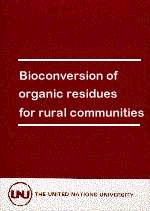
Bioconversion of Organic Residues for Rural Communities (UNU, 1979, 178 p.)
Foreword
We are pleased to share these Proceedings of the first joint workshop of the World Hunger Programme (WHP) and the Programme on the Use and Management of Natural Resources (NRP) of the United Nations University (UNU). The conference was financed by the United Nations University with the supplementary assistance of Unesco and UNEP, and was hosted jointly by the Institute of Nutrition of Central America and Panama (INCAP) and the Central American Research Institute for Industry (ICAITI).
The United Nations University was founded in 1975 and its World Hunger Programme was established in the same year. Its priorities include the post-harvest conservation of food, and food and nutrition policies and programmes that will reduce human hunger. The UNU Programme on the Use and Management of Natural Resources started in 1976. One of the priority areas of this programme is the development of appropriate methodologies for the production of biomass from organic residues, especially in rural areas. Hence, these two UNU components were well suited to a joint effort to encourage research and development of the bioconversion of organic residues for animal and human feeding and the testing of the safety and nutritional value of the end-products of such processing.
To explore the feasibility of a joint UNU WHP-NRP project, a small meeting was convened in Athens (4-5 March 1978). On the recommendation of this group the UN University established, in April 1978, a Task Force on Bioconversion of Organic Residues for Rural Development. This task force was composed of specialists in the fields of nutrition, the testing of non-conventional feed products, bioconversion and biomass production at the farm level, and socio-economic developments in rural communities, as well as experts from FAO, Unesco, and the International Cell Research Organization (ICRO) in their private capacities.
At its first meeting, in June 1978 at the Institute for Animal Nutrition Research (ILOB) in Wageningen, Netherlands, the task force formulated the plan and an outline for this conference on the State of the Art of Bioconversion of Organic Residues for Rural Communities, which was held in Guatemala City, Guatemala, 13 - 15 November 1978. The goal of the conference was an inventory of recent developments in selected fields of biomass production through bioconversion of organic residues specifically aimed at improving the socio-economic, nutritional, and health conditions of low-income communities in rural areas.
The enormous potential of the smallest among living organisms - yeasts, bacteria, fungi, and algae - to upgrade organic wastes into valuable feed and fodder through simple fermentation processes has become increasingly recognized. This awareness is timely, for more efficient utilization of the world's resources and their recycling have become essential.
The fact that huge quantities of organic residues are discarded and pollute the environment, while in fact they form an enormous potential for feed and food production, is being realized more and more. For instance, the amount of cellulosic wastes, in the form of rice straw, in Southeast Asia amounts to 300 million tons a year.
Also, the quantity of residues from the production of fruit, cassava, rubber, coffee, sugar, and sisal, to mention a few of the world's major commodities, is staggering. In addition, animal and human wastes are excellent starting material for bioconversion, and are found in large quantities wherever human and animal populations are concentrated. Upgrading of these residues through microbiological processes can make an important contribution to self-sufficiency in rural regions and to human welfare in general.
Nutritional and toxicological evaluation of the various forms of biomass derived by microbiological conversion of organic residues and wastes is, in most cases, non-existent. Consequently, the task force, following the trend set by the Protein-Calorie Advisory Group of the UN system, is paying great attention to this aspect of bioconversion processes.
Fermentation is a simple, low-cost process, which, in its various forms, has been practiced traditionally for food processing at farm and village levels in many regions of the world over hundreds of years. Bioconversion of organic wastes into valuable fodder is, in principle, no different from food fermentation processes and can be carried out efficiently in rural areas where organic wastes are abundantly available and often pose environmental and health hazards.
The workshop proposed that the product of microorganisms plus substrate resulting from the micro-biological processing of organic residues be referred to as "microbial biomass product," or MBP. The papers presented in this publication draw attention to the high potential of MBP, and it is hoped that they will stimulate research and feasibility studies for application at the village level.
Dr. Cyril A. Shacklady, of ILOB, served as the technical editor of these Proceedings, which were prepared for publication by Miss Jane Dittrich. Dr. Anton Burgers, Senior Programme Officer, represented the Programme on the Use and Management of Natural Resources at the conference.
Nevin S. Scrimshaw
Senior Adviser
World Hunger Programme
Walter Manshard
Vice-Rector
Programme on the Use and Management of Natural Resources